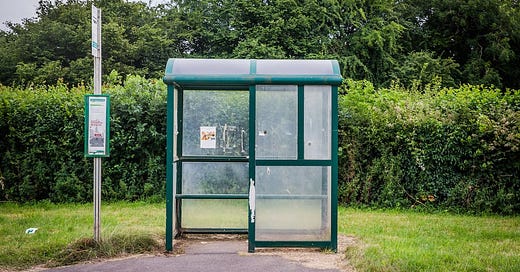She was waiting at a bus stop, on the tiny, potholed little side street that I always go down on my way home. It was a chance encounter. I thought for a second about taking another way, but my muscle memory made the decision and in just a few seconds I was there, right in front of her. I slowed and looked her in her eyes, the eyes that I've loved since the first time I saw them 26 years ago, the face that I hadn't seen for a year, ever since she embarked on her journey to become a man and cut ties from me without a word. A stranger looked right through me, slightly angry and failing to give any sign of recognition. Yes, it was most definitely my daughter. And yet in a way, it wasn't. This angry stranger gave no sign of welcome, no hint of connection. Who was this person, this angry stanger, inhabiting the body of a daughter who no longer exists? The moment passed, and as I continued on up the street my eyes filled with tears. Unable to continue, I pulled over to the side of the road. I watched in the rear view mirror as the stranger pecked into her phone with an air of extreme emotion. Apparently she was upset with me, for the crime of driving down the street and randomly catching a glimpse of her. I watched as the bus pulled up, she got on, and she was gone.
What do you do, after this? Filled with emotions that defy words, I walked to a nearby tattoo shop and had two words tattooed on my left arm, where I can see them all the time. Deo Volente, which means, “If God Wills”. Beyond a miracle, there is no hope for a reconciliation of a relationship so broken.
That was almost two years ago. I haven't seen her since.
I've been hearing a lot lately about ambiguous loss. It's used to describe a loss that has no resolution, and it's recognized more and more as a particularly painful and destructive kind of grief. One definition reads as follows: “Ambiguous loss is a loss that occurs without closure or clear understanding. This kind of loss leaves a person searching for answers, and thus complicates and delays the process of grieving, and often results in unresolved grief.”
This defines my daily life perfectly. As the years pass, the estrangement still rock solid with zero communication, my grief has not dimmed. This loss is very much unresolved, and as more time passes I have come to believe that it will never resolve. I will live in a state of grief, unless something changes, for the rest of my life.
For too many parents, this is the ambiguous loss that is a daily and constant reality. I don't know where my daughter is. I don't know how she is doing. She wrote me a letter, telling me that she no longer desired to have her in my life, and then she disappeared. I understand that this is something she has to do. There is no way that she can bridge the gap between the life she is trying to live, and the steady gaze of someone who loves her and won't affirm that delusion. She had to choose. I hope, every day, that she is happy. Truly I do. But she is a missing person in my life, and for me that brings ambiguous grief that has no closure and no relief. She's been kidnapped by an ideology, and I don't know if she will be back. If she does come back someday, I don't know who she will be.
How does one go on with life, in the midst of a loss like this? It colors every moment, as if looking through a filter.
I've also read that therapy is not usually very helpful to people experiencing ambiguous loss. Since there is no way to resolve it, it must be lived with, in the present. I practice radical acceptance, and deal with the grief the best I can. It's been found that the most helpful thing in this type of loss is community support. Some of us are lucky and have friends, family, or faith communities that understand and support families in the midst of this. But many others have found themselves isolated in a culture that blames and shames parents for their “lack of support”. It's critical that parents are supported by others who understand their grief, their fear, and their pain. That is why parent support is so needed.




Lynn you have provided marvellous platforms for parents like us to connect and grieve together. The point for me now is to continue to gain strength from each other, stay strong; because most of our wandering children will one day (re)gain their senses, remember their innate love for their family, and want to come back.
I need help to rescue (kidnap) my son.